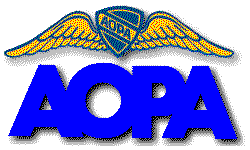Boyer Cites Detrimental Effects On GA In Other Countries
Radical changes to the way the Federal Aviation Administration
(FAA) is funded are standing in the way of modernizing
America’s air traffic control system. That's the core message
the Aircraft Owners and Pilots Association (AOPA) delivered to
Congress Wednesday, in prepared testimony to the House Aviation
subcommittee.

In his written statement, AOPA President Phil Boyer told how the
FAA has spent the last two years manufacturing a funding crisis to
justify a switch from a tried-and-true funding mechanism, to a
system of air traffic control user fees and huge increases in taxes
on general aviation users -- one that AOPA says actually provides
less money, and has proven extremely detrimental to general
aviation whenever it has been implemented anywhere in the
world.
"[T]his is nothing less than the government backing away from a
world-renowned air transportation system and setting in motion the
steps towards privatizing the Air Traffic Control (ATC) system,"
Boyer stated.
"My request to you, Mr. Chairman and members of the
Subcommittee, reject the calls for user fees for any segment of
aviation [original emphasis] and the almost quadrupling of general
aviation fuel taxes," said Boyer. "Then we can all get on with the
real issues at hand through a productive, meaningful discussion on
how to strengthen the nation’s airports and modernize air
traffic control."
 The FAA is currently funded by a
combination of fuel excise taxes, airline passenger ticket taxes,
taxes on air cargo, and a contribution from the general tax
fund.
The FAA is currently funded by a
combination of fuel excise taxes, airline passenger ticket taxes,
taxes on air cargo, and a contribution from the general tax
fund.
Boyer (right) states no fewer than three government
agencies have said the current system is sufficient. Both the
Government Accountability Office and the Congressional Budget
Office have testified that ATC modernization can be accomplished
under the current funding structure. The Inspector General's office
of the US Department of Transportation has also stated that the
current tax system can finance the FAA while increasing spending
for the so-called Next Generation Air Transportation System as long
as there is a general fund contribution, according to AOPA.
In his prepared testimony, Boyer explained an AOPA financial
analysis of the current structure that shows that the FAA could
spend some $20 billion on ATC modernization over a five year
reauthorization time frame and still end up with an uncommitted
balance in the Aviation Trust Fund of more than $7 billion.
The FAA has repeatedly pointed to other nations that have
switched to a user fee-based funding mechanism. But Boyer told
Congress, "Seventy percent of the world's general aviation aircraft
and the majority of the world's licensed and active general
aviation pilot population resides in America, which makes
comparisons of our air transportation system to other countries'
almost impossible."
Boyer cited the safety implications of user fees and
congestion-based pricing (another FAA proposal), highlighting the
dilemma a general aviation pilot would face in Germany. There, a
pilot faced with deteriorating weather conditions would face a
$1,000 penalty for deciding for safety reasons to use a precision
approach at an air carrier airport.
"This is due," Boyer said, "to user fee pricing schemes and
congestion management principles aimed at deterring general
aviation pilots from using the services that end up affecting
safety decisions."
Boyer also noted a former proponent of a fee-based system in
Australia attributes a 28% decline in general aviation activity
over the past 20 years in that country to user fees.
Dick Smith, the former head of Australia's Civil Aviation
Authority, recently observed, "User pays (as we call it here) or
the commercialization of Civil Aviation Safety Authority and
Airservices, has been a disaster for general aviation in Australia
and I believe the same will happen in the USA if it goes
ahead."
Boyer told panel members that a survey of AOPA's nearly 411,000
members bears that out. If the FAA funding proposal, with its user
fees and 344% fuel tax increase, is approved, he said, "Nine out of
ten AOPA members have told us that ... they will reduce or curtail
their flying."
 Boyer laid out five key
assumptions and principles for the members of Congress:
Boyer laid out five key
assumptions and principles for the members of Congress:
- The United States has the safest and most efficient air
transportation system in the world, moving more aircraft and more
people than the rest of the world combined.
- Excise taxes, not user fees, are the appropriate and
cost-efficient way for all aviation users to support the
system.
- Congress' direct management and oversight of FAA spending and
programs should not be changed.
- National transportation assets vital to the United States
economy require a level of support from general tax revenues. The
general fund contribution to FAA operations should be maintained at
the historical average of 21.5% of the FAA budget.
- Airports are as critical to the aviation transportation system
as on- and offramps are to our federal highway system. Federal
airport funding should be sustained at no less than the current
levels ($3.7 billion).
AOPA, the general aviation community, the airlines, and the FAA
all recognize the need to modernize Air Traffic Control.
"Amazingly, these are points which almost all of us agreed need to
be accomplished," Boyer said. "With user fees off the table, we can
move forward on the real issues."
 ANN's Daily Aero-Linx (04.15.24)
ANN's Daily Aero-Linx (04.15.24) Classic Aero-TV: 'No Other Options' -- The Israeli Air Force's Danny Shapira
Classic Aero-TV: 'No Other Options' -- The Israeli Air Force's Danny Shapira Aero-News: Quote of the Day (04.15.24)
Aero-News: Quote of the Day (04.15.24) Airborne 04.16.24: RV Update, Affordable Flying Expo, Diamond Lil
Airborne 04.16.24: RV Update, Affordable Flying Expo, Diamond Lil ANN's Daily Aero-Term (04.16.24): Chart Supplement US
ANN's Daily Aero-Term (04.16.24): Chart Supplement US





